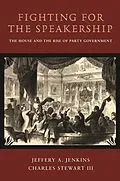The Speaker of the House of Representatives is the most powerful partisan figure in the contemporary U.S. Congress. How this came to be, and how the majority party in the House has made control of the speakership a routine matter, is far from straightforward. Fighting for the Speakership provides a comprehensive history of how Speakers have been elected in the U.S. House since 1789, arguing that the organizational politics of these elections were critical to the construction of mass political parties in America and laid the groundwork for the role they play in setting the agenda of Congress today.
Jeffery Jenkins and Charles Stewart show how the speakership began as a relatively weak office, and how votes for Speaker prior to the Civil War often favored regional interests over party loyalty. While struggle, contention, and deadlock over House organization were common in the antebellum era, such instability vanished with the outbreak of war, as the majority party became an "organizational cartel" capable of controlling with certainty the selection of the Speaker and other key House officers. This organizational cartel has survived Gilded Age partisan strife, Progressive Era challenge, and conservative coalition politics to guide speakership elections through the present day. Fighting for the Speakership reveals how struggles over House organization prior to the Civil War were among the most consequential turning points in American political history.
Autorentext
Jeffery A. Jenkins is associate professor of politics at the University of Virginia. Charles Stewart III is the Kenan Sahin Distinguished Professor of Political Science at the Massachusetts Institute of Technology.
Inhalt
List of Illustrations vii
List of Tables ix
List of Abbreviations xi
Preface xiii
Chapter 1
Introduction 1
Chapter 2
The Evolving Roles and Responsibilities of House Officers in the Antebellum Era 25
Chapter 3
Organizational Politics under the Secret Ballot 56
Chapter 4
Bringing the Selection of House Officers into the Open 76
Chapter 5
Shoring Up Partisan Control: The Speakership Elections of 1839 and 1847 109
Chapter 6
Partisan Tumult on the Floor: The Speakership Elections of 1849 and 1855-1856 151
Chapter 7
The Speakership and the Rise of the Republican Party 193
Chapter 8
Caucus Governance and the Emergence of the Organizational Cartel, 1861-1891 241
Chapter 9
The Organizational Cartel Persists, 1891-2011 274
Chapter 10
Conclusion 303
Appendixes
House Officer Elections and Caucus Nominations 323
Appendix 1
Summary of House Organization, First-112th Congresses (1789-2011) 324
Appendix 2
Election of House Speaker, First-112th Congresses 332
Appendix 3
Election of House Clerk, First-112th Congresses 370
Appendix 4
Election of House Printer, 15th-36th Congresses 391
Appendix 5
Summary of Democratic and Republican Caucus Nominations for Speaker, 38th-112th Congresses 398
Appendix 6
Democratic and Republican Caucus Nominations for Speaker, 38th-112th Congresses 403
References 421
Index 439
